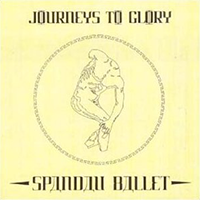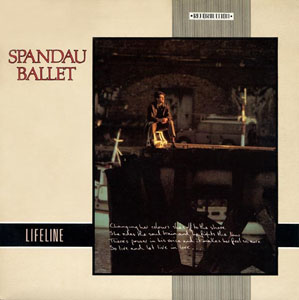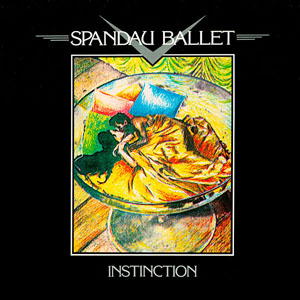
True is the third studio album by English new wave band Spandau Ballet, released on 4 March 1983 by Chrysalis Records. The band's songwriter/guitarist Gary Kemp realised after the release of their second album that the nightclub audience they initially wanted to attract had lost interest in them in part because of the band's transition from dance music to pop. He no longer felt obligated to keep writing music for them and shifted his focus to soul and R&B influences such as Marvin Gaye and Al Green for this album. Kemp thought that bandmate Steve Norman's newfound interest in the saxophone would be well-suited to the sound he was going for, as would the decision to record most of the album at Compass Point Studios in the Bahamas.

"True" is a song by English new wave band Spandau Ballet, released in April 1983 as the title track and third single from their third studio album. It was written by the band's lead guitarist and principal songwriter Gary Kemp to express his feelings for Altered Images lead singer Clare Grogan. Kemp was influenced musically by songs of Marvin Gaye and Al Green he was listening to at the time, and lyrically by Green and the Beatles. "True" reached number one on the UK singles chart in April 1983 and made the top 10 in several other countries, including the US, where it became their first song to reach the Billboard Hot 100.

"To Cut a Long Story Short" is the debut single by the English new wave band Spandau Ballet, released on 31 October 1980. The band began recording the song before they were signed to a record label because of the interest they had generated with a debut concert for patrons of the exclusive weekly London nightclub the Blitz as well as a Christmas party at that establishment. After having tried other popular genres, the band had been preparing to make their debut as performers of dance music and wanted the public to associate them with the young crowd who met at the Blitz every Tuesday. They needed their guitarist/songwriter, Gary Kemp, to come up with something that they could feel confident about presenting to the top tier of the club's regulars at their first performance.

Journeys to Glory is the debut studio album by English synth-pop band Spandau Ballet, released on 6 March 1981 by Chrysalis Records. All of the songs on the album were produced by Richard James Burgess and written by band guitarist Gary Kemp to appeal to the patrons of a weekly Tuesday night club the band started attending called the Blitz, where they were accustomed to hearing "white European dance music". Their performances at the Blitz and other exclusive venues attracted the attention of record labels eager to sign them, and one of the songs they had been performing, "To Cut a Long Story Short", gained popularity through a recording session made at BBC Radio 1.

Diamond is the second studio album by English band Spandau Ballet, released on 12 March 1982 by Chrysalis Records. As with their debut album, Journeys to Glory, all songs were produced by Richard James Burgess and written by band guitarist Gary Kemp. The music was inspired by a variety of genres, including the renewed interest in funk around Soho, American film scores with roots in eastern Europe, the second side of David Bowie's Low album, Pink Floyd records and the mood pieces of another English new wave band, Japan.

Parade is the fourth studio album by English new wave band Spandau Ballet, released on 25 June 1984 by Chrysalis Records. The band wanted the album to sound more like how they played together live, and their guitarist/songwriter Gary Kemp came up with material that he felt would be more appropriate for the arenas in which they performed now since they were attracting larger audiences. Because they would be parading themselves around the world as part of the album's corresponding tour, he hit upon the idea of a parade as the theme of the album and included an international cast of characters taking part in a parade on the album cover.

Through the Barricades is the fifth studio album by English new wave band Spandau Ballet, released on 17 November 1986 by CBS Records. The band was continuing their efforts to replicate the sound of their live performance on a studio album that they had attempted unsuccessfully with their previous album, Parade. They were also wanting to address any misconceptions about their music that came from the success of their first US hit song, "True", and reshape the style of their music to that of a rock band. The title song, which details the struggles in a relationship, was chosen as the album title because of how they felt they were being perceived. Through the Barricades was also their first album with the label after leaving Chrysalis Records because of the downturn in their popularity in the US after "True".

The Singles Collection is a greatest hits album by English pop band Spandau Ballet, released on 4 November 1985 by Chrysalis Records. The album peaked at number three on the UK Albums Chart and was certified double platinum by the British Phonographic Industry (BPI) within six weeks of release. It is the band's best-selling album in the United Kingdom, though despite its success, the album was released without the band's approval as they were leaving Chrysalis Records and signed to CBS Records for their next album.

"Gold" is a song by English new wave band Spandau Ballet, released on 5 August 1983 as the fourth single from their third album, True. The song was written by the band's guitarist/songwriter Gary Kemp as an homage to the film themes of composer John Barry and was especially influenced by his scores for the James Bond series. This was apparent to some music critics, but they were sharply divided in their reviews. Some appreciated the energy and drama behind it, while others found it affected and overwrought. The song peaked at number two on the UK singles chart and made the top 10 in several other countries, but its number 29 showing in the US and the disappointing chart performances of the next two singles released there led to the band's decision to change record labels.

"Lifeline" is a song by English new wave band Spandau Ballet, released on 24 September 1982 as the first single from what would be their third album, True (1983). The song confirmed the band's intent to transition from dance music to pop that was hinted at with their previous single, "Instinction". Some band members found an enjoyable chemistry with "Lifeline" producers Tony Swain and Steve Jolley that was lacking in recording sessions with previous producers. The new song received mixed reviews but reached number 7 on the UK Singles Chart. It was also their first single to chart in the United States, missing the Billboard Hot 100 but charting on the Bubbling Under Hot 100 at number 8. The music video for the song received airplay on the U.S. cable channel MTV.

"Only When You Leave" is a song by English new wave band Spandau Ballet, released as the first single from their fourth album Parade. It peaked at number 3 on the UK Singles Chart and made the top 10 in several other countries but only reached number 34 in the US, where it was their last song to appear on the Billboard Hot 100. Most critics were impressed with Tony Hadley's vocals and enjoyed the song. The music video used its theme of revenge as a way of paying tribute to the late film director Alfred Hitchcock.

"Through the Barricades" is a song by English new wave band Spandau Ballet, released as the second single from their 1986 studio album of the same name. The song was inspired by the murder of a member of the band's road crew in Belfast during The Troubles and emerged as the Spandau Ballet song that the band members rated the best. It reached number six on the UK Singles Chart, becoming their final top ten hit, and made the top ten elsewhere.

"Chant No. 1 " is a song by the English new wave band Spandau Ballet, released on 10 July 1981 as the first single from their second album, Diamond. The band's guitarist/songwriter, Gary Kemp, wanted to pay homage to the latest London hotspot, Le Beat Route, by emulating the funk music that was popular there and even using the club as the location for the music video, all in order to show that the band was still part of the trendy Soho scene. Except for the remix of the song from the album's box set, "Chant No. 1" received good reviews, and the 7-inch single became their third top ten hit in the United Kingdom, peaking at number 3 on the UK Singles Chart.

"Instinction" is a song by Spandau Ballet whose original version was included on their second album Diamond as produced by Richard James Burgess. The song was written by band guitarist/songwriter Gary Kemp. A remix by Trevor Horn was released on 2 April 1982 as the last single from the album and reached number 10 on the UK Singles Chart. This new version received good reviews but constituted a shift into pop music that did not interest the patrons of trendy London nightclubs that Spandau Ballet originally intended to represent. The band tried continuing their work with Horn on the songs for their next album but came to an impasse with him and moved on to a successful relationship with producers Steve Jolley and Tony Swain.

"Muscle Bound" is a song by the English new wave band Spandau Ballet, released as part of the third single from their debut album Journeys to Glory. In the UK, it was released as a double A-side with the song "Glow"; elsewhere, "Glow" was included as the B-side. "Muscle Bound" received mostly good reviews, and the combined single was their third consecutive top 20 hit in their native UK, reaching number 10 on the UK Singles Chart. The music video for "Muscle Bound" was more ambitious than their previous promotional clips and went over budget because of snowy weather that caused delays during the location shoot.

"Highly Strung" is a song by English new wave band Spandau Ballet, released as the third single from the 1984 album Parade. In their native UK, the song reached number 15 on the UK Singles Chart, and critics had a variety of responses to it. The music video used the population density of Hong Kong to demonstrate the song's emotional themes.

"The Freeze" is a song by the English new wave band Spandau Ballet, released on 12 January 1981 as the follow-up to their debut single, the number 5 UK hit "To Cut a Long Story Short". As was the case with that release, the 7-inch single of "The Freeze" featured a dub mix on its B-side, and the 12-inch single had two additional mixes of the song geared toward dance clubs. The cover art used for both formats of the single also repeated its predecessor in having a simple black-and-white classical motif. This design, however, was also seen on the sets of the music video for the song. Reviews of "The Freeze" were mixed. It reached number 17 on the UK Singles Chart.

"Glow" is a song by the English new wave band Spandau Ballet, released on 27 March 1981 in the UK as a double A-side single with "Muscle Bound". The combined single was their third consecutive top 20 hit in their native UK, reaching number 10 on the UK Singles Chart. Elsewhere, "Glow" was released as the B-side with "Muscle Bound" as the A-side. "Glow" was written while their debut album, Journeys to Glory, was in the finishing stages and was subsequently not included, but a few different versions of the song were on the 2010 reissue of the album.

"Paint Me Down" is a song by the English new wave band Spandau Ballet, released on 2 November 1981 as the second single from what would be their second album, Diamond. Their guitarist/songwriter Gary Kemp copied some of the elements of their previous hit, "Chant No. 1 ", and the conflict between producer Richard James Burgess and lead singer Tony Hadley that began with that song continued as they recorded the vocals for "Paint Me Down". A controversial music video for the song was rejected by the British music chart television programme Top of the Pops, and its number 30 peak position on the UK Singles Chart was not enough to justify airing the studio performance they had filmed for the show either.

"She Loved Like Diamond" is a song by the English new wave band Spandau Ballet, released on 11 January 1982 as the third single from what would be their second album, Diamond. The music video and cover art for the single focused on the sexual themes in the lyrics and the allure of the title character. In writing the song, their guitarist/songwriter Gary Kemp was influenced by American Jewish music with an eastern European flavour that he had heard in movie themes and musicals. Most reviews singled out lead singer Tony Hadley's performance as the main problem with the recording, which only mustered a number 49 peak position on the UK Singles Chart. The poor showing prompted the idea to release another song from the album, but the band realized that getting a new single to succeed would require a remix of the disappointing work of their current producer and decided to discontinue their association with him in doing so.






















